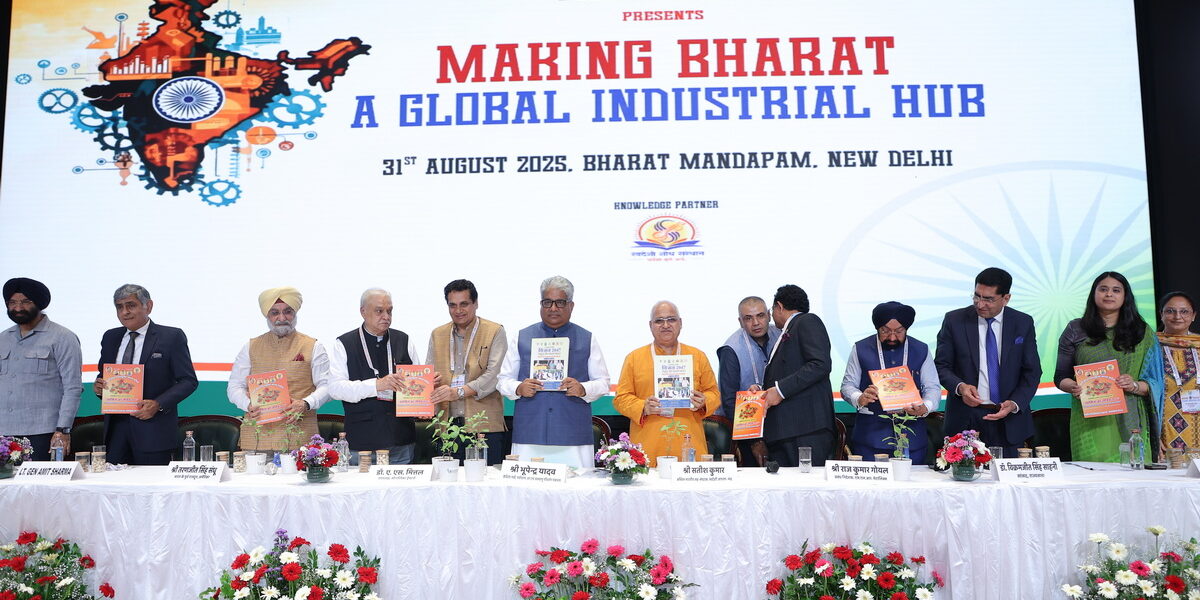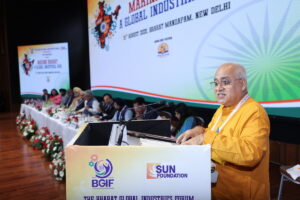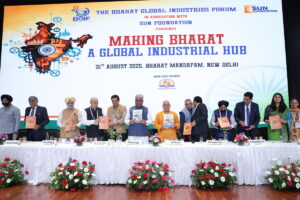Report on “Bharat Global Industries Forum (BGIF) Conclave 2025”
Date: August 31, 2025
Venue: Bharat Mandapam, New Delhi
Organizers: BGIF in association with Sun Foundation and knowledge partner Swadeshi Shodh Sansthan
Theme: “Making Bharat a Global Industrial Hub”
Introduction and Context
The BGIF Conclave 2025 convened an eminent assemblage of industry leaders, policymakers, and experts to deliberate on advancing India as a global industrial powerhouse. The event, held at Bharat Mandapam, New Delhi, was graced by Chief Guests Shri Ram Lal Ji (Akhil Bharatiya Sampark Pramukh, RSS) and Shri Bhupender Yadav (Minister of Environment, Forest and Climate Change), alongside other dignitaries from industry and government. The conclave underscored efforts towards “Vocal for Local” and “Atmanirbhar Bharat,” blending economic nationalism with progressive industrialization.
Key Highlights
Distinguished Participants
Besides the chief guests, notable figures included Shri Satish Kumar and Shri R. Sundaram (CA) of Swadeshi Jagran Manch, Dr. Arvind Sharma (Cabinet Minister, Haryana), Dr. Vikramjeet Singh Sahni (Rajya Sabha MP), Shri Raj Kumar Goel (Vice Chairman, BGIF), and Shri Madusudan Aggarwal (MD, Haldiram Sweets). The conclave benefitted from the presence of international industrial delegates from the United States, Canada, and Australia, reflecting global attention to India’s industrial ambitions.
Eminent Speeches by
Shri Ram Lal Ji
His address articulated a vision grounded in self-reliance and nationalist economic principles aligned with the Swadeshi movement. He emphasized the causal link between social stability and economic prosperity, contrasting the industrial stagnation in regions troubled by unrest with the investment growth in Uttar Pradesh due to peace and stability. Using “Sone ki Chadriya” (sheet of gold) as a metaphor, he highlighted India’s intrinsic wealth and potential despite temporary economic setbacks. He advocated for honest policy frameworks and stressed the role of food processing industries in empowering Indian farmers. Shri Ram Lal also referenced historical colonial trade injustices to contextualize the contemporary industrial revolution (“Udyog Kranti”) underway in India. Infrastructure successes such as the Vande Bharat and Rajdhani trains, and Darbhanga airport, were cited as proof of development momentum.
Shri Bhupender Yadav
He presented an optimistic economic outlook, citing India’s 7.8% GDP growth at the start of the financial year 2026, supported by rises in PMI (7.5%) and steel production (8.5%). The formal employment surge, with 22 lakh new jobs and majority youth participation, was a highlight. He underscored India’s rising international stature, exemplified by the International Solar Alliance headquartered in Gurugram with 137 member nations. His remarks encapsulated India’s resilience and proactive initiatives across science, industry, and sports.
Shri Satish Kumar
Guest of Honour Shri Satish Kumar delivered a dynamic and inspiring address, tracing the immense wealth and rich economic heritage India has held since antiquity. He expressed confidence that the nation is now firmly on the right trajectory, with strong projected GDP growth. Shri Kumar emphasized the unparalleled opportunities India possesses to shape the future global economy. He articulated the vision of India by 2047 as not merely developed in a Western sense but as a great and prosperous nation anchored in its distinct moral and cultural values. His impassioned speech infused the conclave with optimism about India becoming the world’s leading economy in the coming decades.
Panel Discussions
Defense Sector Synergy
A distinguished panel convened insights into the vital collaboration between industry and the defense sector, featuring eminent personalities including Dr. Shivali Chauhan, Lt. Gen. Amit Sharma, Ms. Mrinal Tayal, and Lt. Gen. R.K. Anand. The discussion was deeply focused on the integration of cutting-edge technologies such as artificial intelligence (AI), cybersecurity, and information security within defense manufacturing and operations. The panelists underlined the growing significance of technological innovation in enhancing national defense capabilities, promoting indigenous development of defense equipment, and ensuring secure communication networks. They also discussed the strategic imperatives of defense manufacturing ecosystems, emphasizing collaboration between public and private sectors to build self-reliant defense industries aligned with the ‘Make in Bharat’ initiative. Challenges related to technology transfer, intellectual property, and skill development were candidly addressed, accompanied by a roadmap to strengthen the sector’s technological base.
Food and Critical Metals
Another panel brought sharp focus to the sector-specific issues and emerging opportunities within the food processing industry and critical minerals sector, both recognized as pivot points for Bharat’s industrial growth. Experts deliberated on supply chain resilience, sustainable sourcing, and the importance of leveraging indigenous resources. Discussions covered the vital role of critical metals, essential in electronics, renewable energy infrastructure, and defense technologies, and the imperative for developing domestic mining and refining capabilities to reduce dependency on imports. The food panel stressed innovation in agro-processing, enhancing value addition, and meeting rising domestic and international quality standards. Both panels emphasized policy support, research and development, and public-private partnerships as crucial enablers for sectoral transformation.
Book Launch and Intellectual Discourse
The conclave witnessed the release of The Swadeshi: Empowering Bharat authored by researcher Sonali Chadda. The book provides a rigorous intellectual foundation for the Swadeshi movement, articulating it not only as a political philosophy but as an actionable economic paradigm grounded in indigenous knowledge and sustainability. The launch keynote illuminated the movement’s principles, highlighting pathways to economic self-sufficiency that blend national pride with pragmatic policy design. The scholarly discourse around Swadeshi reflects a broader endeavor to reclaim Bharat’s cultural and industrial sovereignty, positioning it as a blueprint for future development that respects traditional wisdom while embracing modernity.
Strategic Initiatives and Roadmap
A significant outcome of the conclave was the announcement of an upcoming national seminar scheduled for November 9–10, 2025, titled the “Swadeshi Siddh Sansthan, Swadeshi Sansthan and Roadmap.” This seminar aims to move beyond dialogue, seeking to crystallize policy frameworks, implementable strategies, and collaborative action plans across multiple sectors. The event promises to engage a wide spectrum of stakeholders, including industry leaders, academicians, policymakers, and grassroots entrepreneurs, thereby converting vision into tangible programs. Areas of focus include industrial policy reform, technology adoption, skill development, and expanding the Swadeshi market ecosystem nationally and globally. This roadmap emphasizes pragmatic steps toward achieving the 2047 vision of a prosperous, self-reliant Bharat.
Empowerment Focus
The conclave foregrounded the critical role of independent women entrepreneurs in shaping the “Swadeshi” and “Atmanirbhar Bharat” narratives, emphasizing inclusive growth as an imperative for national progress. Discussions underscored challenges faced by women in accessing capital, markets, and technology, alongside promising success stories highlighting women-led ventures driving innovation and community development. The emphasis on women’s economic empowerment aligns with the broader social objective of creating equitable opportunities, forming leadership, and integrating gender perspectives in industrial policies. Such inclusion is viewed as essential to building a resilient economy that harnesses the full potential of its human capital.
Program Schedule (Summary)
The conclave’s meticulously organized schedule spanned diverse thematic sessions designed to provide comprehensive coverage of India’s industrial trajectory.
- Inaugural Session: The conclave commenced with the traditional lamp-lighting ceremony, symbolizing knowledge and enlightenment, followed by welcome addresses delivered by Shri Mittal, Chairman of BGIF, and other distinguished dignitaries. These initial remarks set an inspiring tone, reiterating the urgency and promise of India’s industrial transformation.
- Sectoral Panels on “Vocal for Local,” Food, and Critical Minerals: Experts engaged in in-depth dialogues on the “Vocal for Local” initiative, exploring ways to strengthen domestic manufacturing and consumption. The food panel addressed value-chain enhancements in agriculture and agro-processing, while the critical minerals panel discussed strategies for resource utilization vital for emerging technologies.
- Felicitation Programs and Votes of Thanks: Throughout the conclave, participants were recognized for their contributions, fostering a spirit of collaboration and motivation. The event concluded with formal votes of thanks by Yogesh Mehta and Raj Kumar Goel, expressing gratitude to participants, speakers, and the organizing committee for their invaluable support and intellectual contributions.
This well-structured schedule not only facilitated knowledge exchange but also cultivated actionable insights, reaffirming the conclave as a cornerstone event in Bharat’s industrial renaissance.
Conclusion
The BGIF Conclave 2025 successfully provided a robust platform for discourse on positioning Bharat as a global industrial leader. The synergy of patriotic economic vision, technological innovation, and international collaboration marked the event as a significant step toward sustainable industrial growth. Through progressive policies, social inclusion, and dedicated governance, Bharat’s aspiration to become a resilient and self-reliant industrial hub was emphatically affirmed.
Reported by:
Anushka Verma
Researcher, Swadeshi Shodh Sansthan
August 31, 2025








